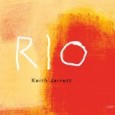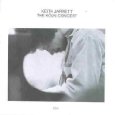My Love-Hate Relationship with Keith Jarrett
Keith Jarrett has yet another solo album out, called Rio. As the title would suggest, it was recorded in Rio de Janeiro. On it we hear the now familiar musical mood swings: from angular vertical runs, acrid harmonies, to unbearably lovely encores. The audience once again goes wild at the end. It’s a two disc set, probably covering most of the concert that night in April, 2011. I wondered as I unpeeled the shrink wrap and label–with a tried and true technique Kurt Elling taught me—how the cariocas–as the residents of Rio de Janeiro are called–would greet a solo piano concert. Brazilian music is often very upbeat, but there is always saudade lurking in the background. As it turned out, Jarrett supplied both in the concert. I particularly love the three encores that close the second cd—the audience goes wild at the end, typical of Jarrett’s fans, although this was, I believe, his first concert in Brazil. He seemed to really be enjoying it. There’s even a photo of him smiling, while sipping a demitasse cup of espresso.
Of course as a solo Keith Jarrett sprung to fame with his Köln Concert of 1977, a record that sold preposterously well for a jazz album. That album was miraculous in other ways: the pianist was sick with food poisoning, the piano wasn’t the right kind, everything was going wrong. Tell that to the millions of people who’ve bought and enjoyed this hugely successful ECM classic. They’d be surprised.
In the beginning I heard Jarrett the same way many in my generation did: performing on Charles Lloyd’s epical Monterey Jazz Festival Concert, Forest Flower (1966). Jarrett, who Lloyd calls “the kid”, is one of many great musicians to come out of Lloyd’s group. Drummer  Jack Dejohnette, part of Jarrett’s standards trio for almost 20 years, is another. Jarrett’s solos behind Lloyd made him a pianist hard to forget. A decade later came the another great pianist, Michel Petrucciani. I first heard Keith Jarrett live in 1966, performing with Art Blakey’s Jazz Messengers at the opening of the LA’s Fox Hills Mall (!) I wondered who this young cat was.
Jack Dejohnette, part of Jarrett’s standards trio for almost 20 years, is another. Jarrett’s solos behind Lloyd made him a pianist hard to forget. A decade later came the another great pianist, Michel Petrucciani. I first heard Keith Jarrett live in 1966, performing with Art Blakey’s Jazz Messengers at the opening of the LA’s Fox Hills Mall (!) I wondered who this young cat was.
I wanted to interview him for a long time. I finally had a chance in 1987 while music director at KCRW. I wanted it to be fun and informal. I picked him and bassist Gary Peacock up at LAX in my mother’s Cadillac. I had the radio tuned to The African Beat. Jarrett got in the car, glared at the radio, and switched it off. Gary Peacock was in the back seat and in a bad mood. His guru, Bhagwan Shree Rajneesh, had just been kicked out of the U.S. We got to the KCRW performance studio, where the piano was tuned and ready. I conveniently put Jarrett’s microphone right next to the keyboard. Jarrett scowled and shut the lid over the keys. There would be no spontaneous performance. He also gave me short, terse answers. I knew his music as well as anyone, had played it on the radio for years, yet he was treating me as an annoyance. In later years I saw him insult audiences, walk off stage if somebody coughed, insult the engineers at his first Disney Hall show. Even the great classical pianists Vladimir Horowitz and Artur Rubinstein never acted so petulantly. Who was Jarrett to do it?
A few months later I was at a music conference in Minneapolis and there was Keith Jarrett again, this time telling a bunch of tourists how he conceived and performed his solo shows. They were asking really dumb questions: Was the music all written down and memorized? Was he influenced by George Winston? I remember thinking, “he was so rude to me, yet he’s being fantastically patient and kind to these ignoramuses. What’s up with this guy anyway?!!!!!”
And yet Keith Jarrett can kill you with musical beauty, can wound you with his chords, his unpredictable harmonic progressions. The unusual way he voices harmonies, his fluid right-hand runs, his amazing flights of fancy. No wonder fans forgive him. I forgive him too.
Here’s the final encore from cd 2. It’s a beauty, lilting and lovely, and sweeps the Rio de Janeiro audience away.

Audio clip: Adobe Flash Player (version 9 or above) is required to play this audio clip. Download the latest version here. You also need to have JavaScript enabled in your browser.
← BACK